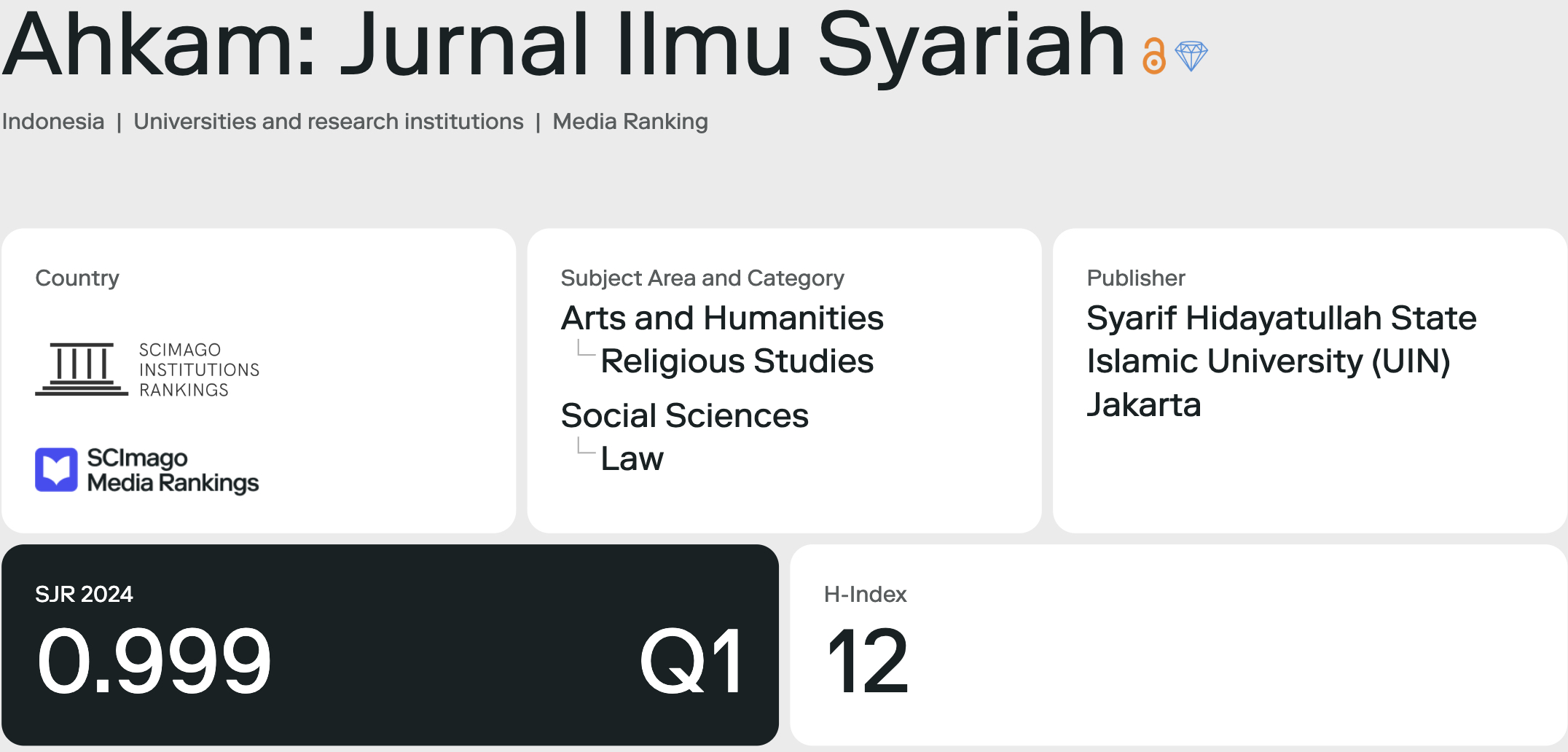Legal, Moral, and Spiritual Dialectics in the Islamic Restorative Justice System
DOI:
https://doi.org/10.15408/ajis.v21i2.22675Keywords:
restorative justice, God’s rights, human beings’ rights, legal justice, social justice.Abstract
Islamic law is special and unique since it is from revelation. In restorative justice systems, Islam integrates legal, moral, and spiritual aspects in its enforcement. The integration of these three aspects is clear in the philosophy of law, legal construction, and the determination of legal actions and sanctions. The purpose of this study is to examine the integration of these three aspects in forming a restorative justice model through the classification of authority (ḥuqūq) in Islamic law. According to the law, the classification of God and human rights and the mixture of these two determines different models of restorative justice enforcement. In general, the law rules in God’s authority (ḥuqūq Allāh) and produces the enforcement of offender centered models of restorative justice through repentance (tawbat) and redemption (kaffārāt). Furthermore, it also rules under human authority (ḥuqūq al-’abd) and in a mixture of the two rights, producing a victim-centered model of restorative justice through compensation (diyah) and forgiveness. The two restorative justice models balance protection, access, and obligations in the inforcement of legal and social justice.
Abstrak: Hukum Islam memiliki karakter khusus yang membedakannya dengan sistem hukum yang lain. Dalam restorative justice system, Islam mengintegrasikan aspek legal, moral, dan spiritual dalam penegakkannya. Integrasi ketiga aspek tersebut terlihat dalam filosofi hukum, konstruksi hukum, penetapan tindakan dan sanksi hukum. Artikel ini mengeksplorasi bagaimana integrasi ketiga aspek tersebut membentuk model keadilan restoratif, melalui pengklasifikasian otoritas (ḥuqūq) dalam hukum Islam. Dalam penetapan hukum, klasifikasi hak Tuhan, hak manusia, dan campuran antara hak Tuhan dan hak manusia menentukan perbedaan model penegakkan keadilan restoratif. Aturan hukum yang berada dalam otoritas Tuhan (ḥuqūq Allāh) menghasilkan model penegakan keadilan restoratif yang berpusat pada pelaku tindak pidana, melalui hukuman yang berupa taubat dan kaffārāt. Aturan hukum yang berada dalam otoritas manusia (ḥuqūq al-’abd) dan campuran otoritas Tuhan dengan otoritas manusia menghasilkan model keadilan restoratif yang berpusat pada korban, yaitu melalui penerapan hukum kompensasi (diyat) dan pemaafan terhadap pelaku. Kedua model keadilan restoratif ini bertujuan untuk memberikan keseimbangan perlindungan, akses, dan kewajiban dalam penegakan keadilan hukum dan keadilan sosial.
References
Absar, A. A. (2020). Restorative Justice in Islam with Special Reference to the Concept of Diyya . Journal of Victimology and Victim Justice, 3(1), 38–56. https://doi.org/10.1177/2516606920927277
Ahmad, K., & Hassan, A. (2000). Distributive Justice: The Islamic Perspective. Intellectual Discourse, 8(2), 159–172.
Ali, S. S. (2011). Teaching and Learning Islamic Law in a Globalized World: Some Reflections and Perspectives. Journal of Legal Education, 61(2), 206–230.
Allan, T. R. S. (2020). Law as a Branch of Morality: The Unity of Practice and Principle. The American Journal of Jurisprudence, 65(1), 1–17. https://doi. org/10.1093/ajj/auaa001
Anwar, S. (2018). Ushūl al-Fiqh: Dirāsah Naqdiyyah fī Alyāti Iktisyāfī al-Ahkām al- Shari’ah. Yogyakarta: Majmū’ al-Buḥūts wa at-Tathbiqāt al-Islāmiyah Jami’ah Muhammadiyah Biyukyakarta.
Askari, Hussain, & Mirakhori, A. (2020). Conception of Justice from Islam to the Present (Political; Hossein Askari & D. Zahedi, eds.). https://doi.org/https:// doi.org/10.1007/978-3-030-116084-5
Asyraf, H. A. R., Wan Ibrahim, W. A., & Nooraihan, A. (2012). Islamic concept of social justice in the twentieth century. Advances in Natural and Applied Sciences, 6(8), 1423–1427.
Auda, J. (2008). Maqasid al-Shariah: A Beginner’s Guide. London: International Institute of Islamic Thought.
Aziz, U. M. S. A. (2013). al-Aḥkām al-Shar’iyyah bayna at-Ta’abbudī wa Ma’quliyyāt al-Ma’nā. Kairo: Dār al-Baṣāir.
Ben-Menahem, H., & Ben-Menahem, Y. (2020). The Rule of Law: Natural, Human, and Divine. Studies in History and Philosophy of Science Part A, 81(March 2018), 46–54. https://doi.org/10.1016/j.shpsa.2019.05.001
Berman, H. J. (2000). The Spiritualization of Secular Law : The Impact of the Lutheran Reformation. Journal of Law and Religion, 14(2), 313–349. Retrieved from http://www.jstor.org/stable/3556574
Bix, B. H. (2018). Kelsen, Hart, and legal normativity. Revus, (34). https://doi. org/10.4000/revus.3984
Bustamante, T. (2019). Law, moral facts and interpretation: A Dworkinian response to Mark Greenberg’s moral impact theory of law. Canadian Journal of Law and Jurisprudence, 32(1), 5–43. https://doi.org/10.1017/cjlj.2019.1
Chui, W. H., Cheng, K. K. Y., & Wong, L. P. (2013). Spirituality and punitiveness: An exploration of Christian, Buddhist, and non-religious attitudes towards crime. International Journal of Law, Crime and Justice, 41(1), 1–15. https:// doi.org/10.1016/j.ijlcj.2012.11.001
Davis, D. R. (2007). Hinduism as a Legal Tradition. Journal of the American Academy of Religion, 75(2), 241–267. https://doi.org/10.1093/jaarel/lfm004
Dekker, S. W. A., & Breakey, H. (2016). “Just culture:” Improving safety by achieving substantive, procedural and restorative justice. Safety Science, 85, 187–193. https://doi.org/10.1016/j.ssci.2016.01.018
Domingo, R. (2019). Why Spirituality Matters for Law : An Explanation. Oxford Journal of Law and Religion, 32(July), 326–349. https://doi.org/10.1093/ojlr/ rwz018
Duke, G. (2016). The Weak Natural Law Thesis and the Common Good. Law and Philosophy, 35(5), 485–509. https://doi.org/10.1007/s10982-016-9270-4
Dworkin, R. (2011). Justice for Hedgehogs. Cambridge: Harvard University Press.
Dzhansarayeva, R. Y., Turgumbayev, M. Y., Malikova, S. B., Taubayev, B. R., & Bissenova, M. K. (2014). The concept and signs of punishment in islamic law. Middle - East Journal of Scientific Research, 19(5), 734–739. https://doi. org/10.5829/idosi.mejsr.2014.19.5.21028
El Fadl, K. A. (2017). Qur'anic Ethics and Islamic Law. Journal of Islamic Ethics, 1(1–2), 7–28. https://doi.org/10.1163/24685542-12340002
El Fadl, K. A., Ahmad, A. A., & Hassan, S. F. (2019). Routledge handbook of Islamic law. In K. A. El Fadl, A. A. Ahmad, & S. F. Hassan (Eds.), Routledge Handbook of Islamic Law. https://doi.org/10.4324/9781315753881
Fallon, A. (2020). Restoration as the spirit of Islamic justice. Contemporary Justice Review: Issues in Criminal, Social, and Restorative Justice, 00(00), 1–14. https:// doi.org/10.1080/10282580.2019.1700370
Goldstein, J. D. (2012). Rescuing the new natural law theory: From absolute values to a theory of autonomy. Canadian Journal of Political Science, 45(2), 451–472. https://doi.org/10.1017/S0008423912000406
Green, L. (1996). The Concept of Law Revisited. Michigan Law Review, 94(6).
Greenberg, M. (2010). The Standard-Picture and Its Discontents. In L. Green & B. Leiter (Eds.), Oxford Studies in Philosophy of Law (pp. 39–106). Retrieved from https://ssrn.com/abstract=1103569
Greenberg, M. (2014). The Moral Impact Theory of Law. The Yale Law Journal, 123, 1288–1342.
Hallaq, W. B. (2009). An Introduction of Islamic Law. New York: Cambridge University Press.
Hart, H. L. . (1961). The Concept of Law. Oxford: Oxford University Press.
Hascall, S. C. (2011). Restorative Justice in Islam: Should Qisas be Considered A Form of Restorative Justice? Berkeley Journal of Middle Eastern & Islamic Law, 4(1), 35–78. https://doi.org/https://doi.org/10.15779/z385P40
Hershovitz, S. (2015). The end of jurisprudence. Yale Law Journal, 124(4), 1160– 1204. https://doi.org/10.1057/9781137015006_6
Islam, M. J., Suzuki, M., Mazumder, N., & Ibrahim, N. (2018). Challenges of implementing restorative justice for intimate partner violence: An Islamic perspective. Journal of Religion and Spirituality in Social Work, 37(3), 277–301. https://doi.org/10.1080/15426432.2018.1440277
John T Noonan, J. (1962). The Concept of Law By H.L.A Hart. The American Journal of Jurisprudence, 7(1), 169–177.
Kashani, M. R. A. (2017). An Overview on the Dimensions and Pillars of Justice in Islam. Review of European Studies, 9(3), 1. https://doi.org/10.5539/res.v9n3p1
Kashani, M. R. A. (2018). An introduction to Concepts of Justice in Islam. Advances in Social Sciences Research Journal, 5(11), 342–353. https://doi.org/10.14738/ assrj.511.5554
Khan, N. (2017). Divine Duty: Islam and Social Justice. Journal of Chemical Information and Modeling, 110(9), 1689–1699.
Levinson, J. (2015). Court Systems: Jewish (Halacha) Law. In Encyclopedia of Forensic and Legal Medicine: Second Edition (Vol. 1). https://doi.org/10.1016/ B978-0-12-800034-2.00090-2
MA, A. (2018). Islamic Criminal Law: The Divine Criminal Justice System between Lacuna and Possible Routes Citation: Journal of Forensic and Crime Studies, 2(1), 1–8. Retrieved from www.scholarena.com
MacInnis, L. (2020). Dworkin’s Unity of Value: An Interpretation and Defense. Res Publica, 26(3), 403–422. https://doi.org/10.1007/s11158-020-09452-6
Maghfirah, A. A., Risandy, D. A., & Hilimi, N. (2016). Sulh’In Islamic Criminal Law as The Form of Restorative Justice: A New Framework in Indonesian Criminal Law. … of Istambul Turkey. 2nd-3rd of …, 2(APRIL), 2–3. Retrieved from http://ase-scoop.org/papers/IWLP-2016/6.Maghfirah_IWLP.pdf
Marshall, E. O. (2017). Theological Humility in the World of Law. Journal of Law and Religion, 32(1), 93–97. https://doi.org/10.1017/jlr.2017.17
McClish, M. (2019). From Law to Dharma: State Law and Sacred Duty in Ancient India. Journal of Law and Religion, 34(3), 284–309. https://doi.org/10.1017/ jlr.2019.36
Munir, M. A. (2017). Dichotomy of Idealism and Realism : Islamic Legal Tradition between Modern and Postmodern. Islamic Studies, 56(1), 53–76. Retrieved from https://www.jstor.org/stable/10.2307/26617639
Murnisa, M. (2015). Sharia Law and the Death Penalty: Would Abolition of the Death Penalty be Unfaithful to the Message of Islam? Retrieved from www. penalreform.org
Peters, R. (2005). Crime and Punishment in Islamic Law. Cambridge: Cambridge University Press.
Porter, J. (2014). Divine Commands, Natural Law, and the Authority of God. Journal of the Society of Christian Ethics, 34(1), 3–20. https://doi.org/10.1353/ sce.2014.0000
Powell, E. J. (2013). Islamic law states and the International Court of Justice. Journal of Peace Research, 50(2), 203–217. https://doi.org/10.1177/0022343312470275
Qafisheh, M. M. (2012). Restorative justice in the Islamic penal law: a contribution to the global system. International Journal of Criminal Justice Sciences, 7(1), 487–507.
Schenker, J. G. (2008). Assisted Reproductive Technology: Perspectives in Halakha (Jewish religious law). Reproductive BioMedicine Online, 17(SUPPL. 3), 17– 24. https://doi.org/10.1016/S1472-6483(10)60326-4
Schröter, J. (2017). God’S Righteousness and Human Law: a New Testament Perspective on Law and Theology. Journal of Law and Religion, 32(1), 9–16. https://doi.org/10.1017/jlr.2017.21
Siddique, B. A., Zahid, M., Rana, R., & Azeem, M. (2019). Islamic Justice System with Special Reference to Human Rights. Journal of Social Sciences and Humanity Studies, 5(5), 1–7.
Stroup, B. (2019). Conceptualizing and implementing a restorative justice concentration: transforming the criminal justice curriculum. Contemporary Justice Review: Issues in Criminal, Social, and Restorative Justice, 22(4), 334– 350. https://doi.org/10.1080/10282580.2019.1672046
Thompson, J. C. (2019). Law’s Autonomy and Moral Reason. Laws, 8(1), 6. https:// doi.org/10.3390/laws8010006
Van Ness, D. W., & Strong, K. H. (2015). 3 - Restorative Justice: Justice That Promotes Healing BT - Restoring Justice (Fifth Edition). 43–60. https://doi. org/10.1016/B978-1-4557-3139-8.00003-0
Wan Muhammad, R., & Abdul Salam, K. (2018). The Concept of Retributive and Restorative Justice in Islamic Criminal Law with Reference to the Malaysian Syariah Court. Journal of Law and Judicial System, 1(4), 8–16. Retrieved from http://irep.iium.edu.my/66776/
Wilson, D. B., Olaghere, A., & Kimbrell, C. S. (2017). Effectiveness of Restorative Justice Principles in Juvenile Justice: A Meta- Analysis Effectiveness of Restorative Justice Principles in Juvenile Justice: A Meta-Analysis.
Winslade, J. (2019). Can restorative justice promote social justice? Contemporary Justice Review: Issues in Criminal, Social, and Restorative Justice, 22(3), 280– 289. https://doi.org/10.1080/10282580.2019.1644173
Zuhaylī, W. (1997). Al-Fiqh al-Islāmī wa Adillatuh (IV). Beirut: Dār al-Fikr.
Zuhaylī, W. (2013). Ushul al-Fiqh al-Islāmī. Beirut: Dār al-Fikr al-Mu’āsirah.








